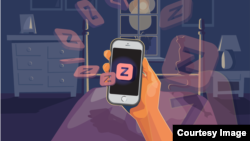Sleep deprivation has been linked to weakened immune systems and could cost the U.S. economy hundreds of billions, so it is no wonder many Americans are looking to apps to help them sleep.
A new analysis of the 35 popular apps available to download has led researchers to say the apps need improvement.
There are hundreds of sleep apps available for Android devices or iPhones, most use soothing sounds to help people fall asleep. But researchers say less than half of the apps they looked at offered any “general information about sleep” or explain the hazards of not getting enough sleep.
"We were surprised that some of the apps didn't say anything about the recommended amount of sleep someone should get on a regular basis," said University of Illinois kinesiology and community health professor Diana Grigsby-Toussaint, who led the new analysis with colleagues at the New York University School of Medicine . "And there weren't a lot of apps that had any information about the benefits of sleep."
They also looked at whether the apps “include reminder messages to help users meet their sleep goals,” where they linked to social media so that the user could get positive reinforcement from friends, and did they provide information about what habits enhanced or interfered with sleep.
Most importantly, did the apps help the users sleep?
"From a population health perspective, I really see this as how do we use these apps in terms of educating people about the importance of sleep," she said. "And how do you then use the apps as a tool to help people to get to that point where they do engage in healthy sleeping habits?"
According to the researchers, many of the apps were well designed, but “just four of the 35 apps described the health risks associated with not getting enough sleep, like high blood pressure, diabetes, obesity and depression.”
Just four provided information about habits that can cause sleep problems such as drinking alcohol or caffeine before bedtime. Only six had “sleep reminders,” and only one “included rewards or praise for success in reaching one's goals.”
The analysis was published in the journal Preventive Medicine Reports.





